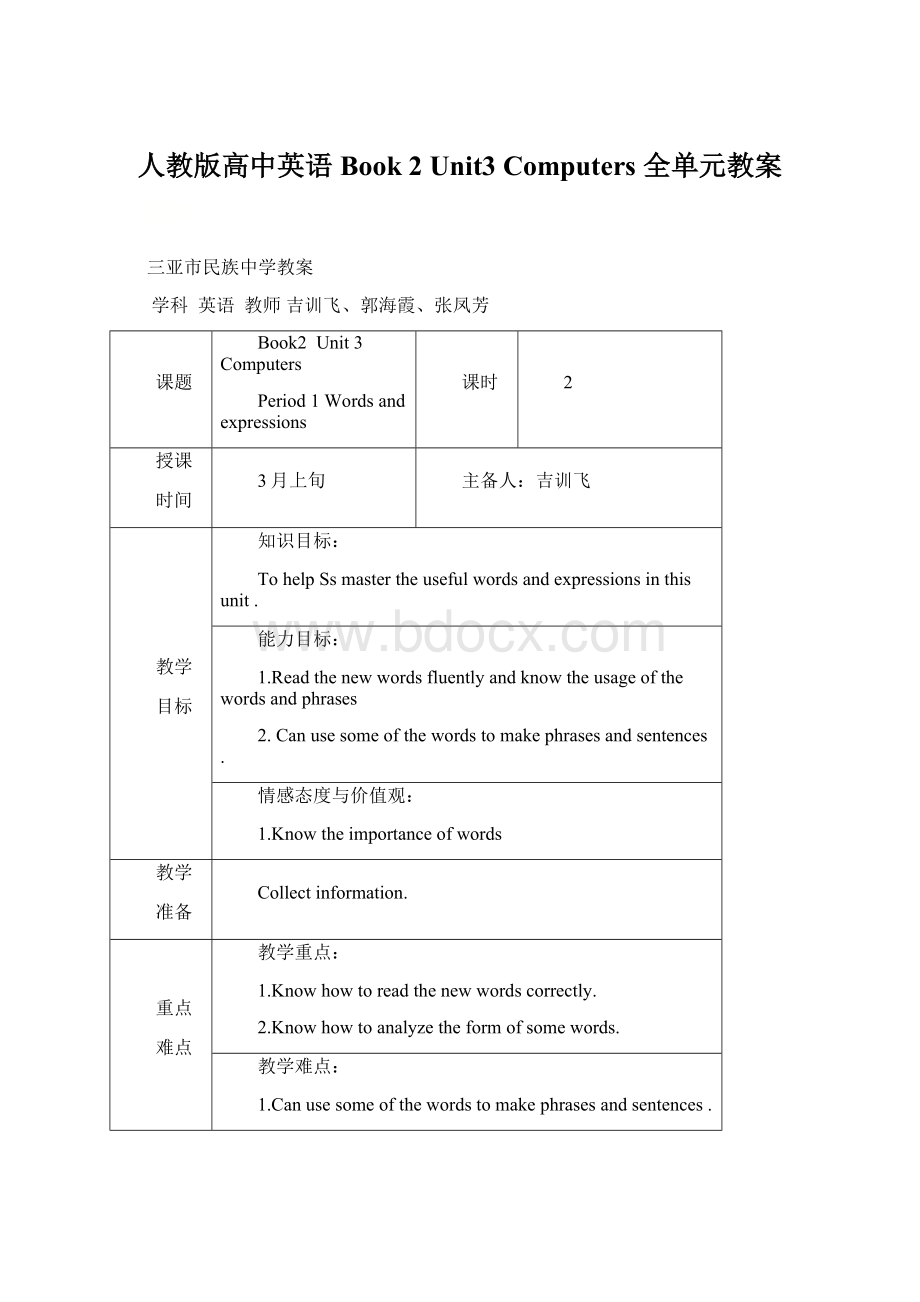人教版高中英语 Book 2 Unit3 Computers 全单元教案Word格式文档下载.docx
《人教版高中英语 Book 2 Unit3 Computers 全单元教案Word格式文档下载.docx》由会员分享,可在线阅读,更多相关《人教版高中英语 Book 2 Unit3 Computers 全单元教案Word格式文档下载.docx(22页珍藏版)》请在冰豆网上搜索。

2.Knowhowtoanalyzetheformofsomewords.
教学难点:
1.Canusesomeofthewordstomakephrasesandsentences.
教
学
过
程
教师活动
学生活动
个人修改
1.Showthemthekeywordsandexpressionofthepassageasfollows:
2.Guidethemtoreadthenewwords.
3.Askthesstoreadthenewwordsonebyone.
4.Analyzetheprefixandsuffix.
5.Nameeachpartofthecomputer.
6.Translatesomewordsaboutcomputers
1、计算器 2、算盘3、科技
3、个人电脑4、手
提电脑5、网络
6、人工智能7、下载(v)8、计算(v)
7、机器人8、电脑主机
Observethewordsonthescreenandknowwhichwordsareimportant.
Readthenewwordsaftertheradioandunderlinetheimportantones
Practicetheirpronunciation
Thinkandanalyzetheprefixandsuffixwithteacher.
Askstudentstodobythemselvesthenchecktheanswerstogether.
课后
反思
本单元出现科普词汇较多,学生学习起来较困难,通过帮助学生掌握了一些读音规律,但学生基础较差,此环节花时间太多。
学科英语教师郭海霞、张凤芳、吉训飞
Book2Unit3Computers
Period2-3warmingupandreading
主备人:
1Totalkaboutcomputersandknowaboutthehistoryofcomputers
2Getstudentstothinkabouttheadvantagesanddisadvantagesofcomputers
Trytoimprovestudents’readingability----Letstudentsunderstandtherelationshipbetweenmainideaandsupportingdetails
Learningtolearn.
Collectinformationaboutcomputers.
Letstudentsknowaboutthehistoryofcomputers
2Trytoimprovestudents’readingability
1Letstudentsknowhowtolearnbyconclusion.
2Trytoimprovestudents’intergratingskills.
Step1.Warmingup
1Reviewsomebasicwordsrelatedtothetopic”computer”.
2Knowsomescientificwords.Askstudents“Whatdoyouknowaboutcomputers?
”Guess”whoamI?
“accordingtothepictures.(abacus,calculator,hugecomputer,pc,lantop,PDA,androbot)
3Predictthecontentaccordingtothetimeandfindthekeywordaboutthepassage.(thehistoryofcomputers)
Ifyouwanttoknowmoreaboutcomputers,openthebooktoP18andreadthetext“WhoAmI?
”
Step2.skimming
1.whoisthespeaker?
acomputer
2.Inwhatorderisthispassagearranged(安排)?
inorderoftime.
Step3.Scanning
Choosethemainideaofthispassage.
AThecomputerwantstofind“whoheis”.
B.Thefunction(功能)ofthecomputer.
C.Thecomputerbecomespopulararoundtheworld.
D.Thehistoryandtheapplicationsofthecomputer.
Step4.Thetopicsentenceofeachparagraph.
Para1.OvertimeIhavebeenchangedalot.
Para2.Thosechangesonlybecamepossibleasmemoryimproved.
Para3.Since1970smanynewapplicationshavebeenfoundoutforme.
T:
Howdidyoufindthetopicsentenceofeachparagraph?
oneexample:
(Para3)Thesupportingdetailsofthetopicsentence
Whatarethenewapplicationsofthecomputer?
Teacherguidesstudentstoconclude:
Summary:
Atopicsentencesetsoutthemainideaofaparagraph.Atopicsentenceisusuallythefirstorlastsentenceofaparagraph,sometimesitalsoappearsinthemiddleofaparagraph,especiallyinscientificpassage.
Step5:
Whatcanyouinferfromthetext?
A.Thecomputerhasartificialintelligence.
B.Thecomputerchangesalotovertheyears.
C.Thecomputerwasnotconnectedbyanetworkuntilintheearly1960s.
D.Nowthecomputercanonlybeusedtodealwithinformation
Strp6InformalDiscussion.
(thestudentsgetintotwogroups,chooseagroupleaderwhoisallowedtoorganizetheirmemberstodebate)
Whatareadvantagesanddisadvantagesofcomputers?
whicharemore?
Advantages:
ourlifehaschangedinschoolwork,games,emails,music,films,communication,information,photos,shopping,etc.
Disadvantages:
1.Badforoureyesandhealth
2.Awasteoftimeandmoney
3.Makepeopleisolatefromtheirfriends
4.SomepeopleespeciallytheteenagersareaddictedtothecomputergamesandchattingontheInternet.Asaresult,theyhavelittletimetostudy.
5.Somepeopleusethecomputerwrongly.
……
Weshouldmakefulluseoftheadvantagesofcomputerstodevelop.Asastudentweshouldtakeadvantageofittostudyinsteadofplayinggamesorlookingthroughbadinformation.......
Step7Homework
1.writeapassageabouttheadvantagesordisadvantagesofcomputers.
2.Readthetextmoreandfindoutthedifficultkeywordsandphrases
1.Readthewordsinthewordlist.
2.Talking
3.Readthepassageveryquicklyandfindouttheanswers.
4.Readquicklyandfillthetimeandthechangesofcomputers
5.Readandtrytofindoutthetopicsentenceofeachparagraph.
6.Discussingroups:
Whatareadvantagesanddisadvantagesofcomputers?
本课的话题是计算机,介绍计算机的历史,学生们对计算机比较熟悉,因此学习兴趣还是挺高的,但是由于学生基础较差,科普文章出现科普词汇较多,学生对课文的理解还是有一定的难度的。
Book2Unit3Computers
Period4-5Languagepoints
1.Enablestudentslearnaboutthenewwordsan
dphrases
2.Leadstudentstotalkaboutthehistoryofcomputers.
knowtheusageofthewords,phrasesandsentencepatterns.
Knowtheimportanceofmakinguseofthelanguage.
1.Learnabouttheusefulwordsandexpressioninthereadingtext.
Learnabouttheusefulwordsandexpressioninthereadingtextandmakeupsentencesusingthekeywordsandexpressions.
Step1Findoutthelanguagepointsinthepassage.
1.calculatevt.计算→calculation
n.计算→calculator n.计算器
2.universaladj.普遍的;
通用的;
宇宙的→universen.宇宙
3.simplifyvt.简化→simpleadj.简单的
4.operatorn.(电脑)操作员;
接线员→operatevt.操作;
做手术→operationn.手术
5.logicaladj.合逻辑的;
合情理的→logicallyadv.逻辑上;
合逻辑地;
有条理地
→logicn.逻辑
6.technologyn.工艺;
科技;
技术→technologicaladj.科技的
7.intelligencen.智力;
聪明;
智能→intelligenceadj.智能的;
聪明的
8.realityn.真实;
事实;
现实→realizevt.实现→realadj.真实的
9.personaladj.私人的;
个人的;
亲自的→personallyadv.就个人而言;
亲自
10.totaladj.总的;
整个的 n.总数;
合计→totallyadv.完全地;
整个地
11.applicationn.应用;
用途;
申请→applyv.申请;
应用→applicantn.应聘者
12.financen.金融;
财经→financialadj.金融的;
财经的
13.explorevt.&
vi.探索;
探测;
探究→explorationn.探索;
探测
14.electronicadj.电子的→electricityn.电→electricadj.电的
→electricaladj.和电有关的
15.appearancen.外观;
外貌;
出现→appearvi.出现;
好像
【核心句型】
1.from...on 从……时起
2.asaresult 结果
3.so...that... 如此……以至于……
4.humanrace 人类
5.inaway 在某种程度上
6.withthehelpof 在……的帮助下
7.dealwith 处理;
安排;
对付
8.watchover 看守;
监视
1....ittooknearlytwohundredyearsbeforeIwasbuiltasananalyticalmachinebyCharlesBabbage.
……差不多到了两百年之后,查尔斯·
巴比奇才把我制成了一台分析机。
2.Bythe1940sIhasgrownaslargeasaroom,andIwonderedifIwouldgrowanylarger.
到20世纪40年代,我已经长得像一间屋子那么大了,我不知道是否还会长得更大。
3.Iwouldreallyliketoplayagainstahumanteam,forIhavebeenprogrammedtoactjustlikethem.
我真的想和真人球队比赛,因为我被设计得能像他们一样地活动。
Step2Homework
1.Readthetextmore.
2.Trytofindmoreinformationaboutcomputers.
Underlinethekeywordsandphrasesinthepassageandtrytoanalyzethembythemselves.
Practiceandmakeupmoresentencesbythemselves
Domoreexercises
本节课吸取了之前的教训,注重讲练结合,让学生在练中掌握语言点。
但学生在仿造句子的时候,仍然存在很多问题。
Period6-7Grammar
LearnthePresentPerfectPassiveVoice.
Helpthestudentsmasterthewayofusingthecorrectvoice,tellingthedifferencesbetweentheactivevoiceandthepassivevoice.
HowtousethePresentPerfectPassiveVoice.
Step1:
Revisionandlead-in
1.Checkthehomeworkfirst
Ex1:
1totally 2revolution 3artificialintelligence4birth 5simple-minded
6goby
7dealwith
8network 9truly10anyway
Ex2:
revolution;
network;
wentby;
totally;
truly;
simple-minded;
Anyway;
dealwith
Ex3:
1
totally
2amazed
3exciting
4excited
5cheaply6unlucky
2.Lead-in
Say:
Areyoufamiliarwiththesecomputers?
Canyoucallthem?
(asktheSstodistinguishdifferenttypesofcomputers.)
Doyouknowthesenewinventionsofcomputer?
Awrist-wornPChasbeeninventedrecently.
Apen-likecomputerhasalreadybeendeveloped.
(showthemsomepicturesandaskthemtomakesomesentences,usingthePresentPerfectPassiveVoice.)
Eg:
It’sratherahotdaytoday!
Wouldyouliketohaveaswimafterschool?
HaveyoueverswumintheBlueWaterWorld(蓝色水世界)intheOrientalSuntown(东方太阳城)whichhasbeensetupinTaizhou?
Thereabeautifulswimmingpoolhasbeenbuilt.
Manyhighbuildingshavebeensetup.
Lotsofflowersandtreeshavebeenplanted.
Anewbridgehasbeencompleted….
Step2:
Discovering
AsktheSstodiscoverwhetherthesesentenceshavesomethingincommon..Helpthemtolearntheusefulstructure:
thePresentPerfectPassiveVoice.
Step3:
Discussion:
learningthestructure
Givesomeexplanations
1构成:
主动语态被动语态
现在完成时have/hasdone----------→have/hasbeendone
Hehasbeensenttostudythenewtechnologyinthecompany.
Thedirtyclotheshavenotbeenwashed.
Havethewindowsbeencleaned?
Howmanyshoppingcentershavebeenbuiltinthiscity?
2.只有及物动词才有被动语态,不及物动词(词组)没有被动语态